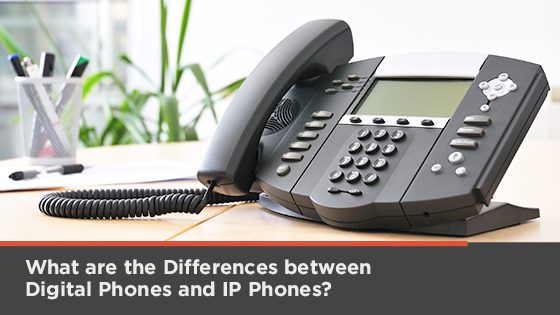If you’re considering a new office phone system, then you may have already discovered that choosing a phone system is not as simple as selecting a fleet of handsets and being done with it. As people’s preferred methods of communication have evolved, telephone technology has raced to catch up.
Digital phones and IP phones are two of the most popular options right now for those that are considering upgrading their communication systems. While the two technologies have much in common, they have many significant differences as well.
So, how do you figure out if you need a digital phone system or an IP phone system? Is one better than the other? Let’s take a look at each of the options as well as their respective pros and cons to help you make the right decision for your business.
What is a Digital Phone System?
Digital phones are essentially the next technological step for the traditional office phone system. These phones still use traditional phone lines but convert the analog sound of your voice into a digital signal that is encoded and then decoded at the other end of the line.
What’s the major difference between the traditional phones you have been using for years and digital phones? It boils down to clarity. Compare an analog television antenna with a digital receiver. The picture quality on the digital receiver will be far better than the analog signal which may have varying quality due to environmental factors.
The Pros of a Digital Phone System
One of the main advantages of a digital phone system is that it connects using traditional phone lines. For most offices, this means that there are no additional lines or equipment which needs to be installed. If the upfront cost of changing your phone system is a concern, then a digital office phone system may be the best way to upgrade without spending a lot of money.
Since digital phones use the same lines as tried, tested, and true analog phones, you can expect no change in reliability. Digital phones have a more straightforward implementation than IP phones which means there are less potential points of failure.
The Cons of a Digital Phone System
A major risk of choosing a digital phone system is mobility, or more specifically, the lack thereof. The system’s PBX port essentially points to a specific location. When you dial a user or number, then it will follow the line to reach the specified user.
If a user changes desks or phone numbers, then the system will require reprogramming. If you don’t have an in-house IT team with the capacity to make these types of changes, it can grow into an irritating expense.
If you are building a new office building, then you may find the cost of wiring for traditional phone lines unnecessary when network wiring can support your IP phones as well as all of your other networking needs.
What is an IP Phone System?
You have likely heard IP phone systems referred to as VoIP or voice over internet protocol. This is the latest step in telecommunications and makes use of the internet rather than traditional phone lines.
Each handset in an IP phone system is programmed with the information it needs. This is in contrast to the digital phone system where a PBX dictates where numbers or users are located.
Pros of an IP Phone System
Arguably the most significant advantage of choosing an IP phone system is mobility. If users need to move to new offices down the hall or across the city, they can take their existing phone with them, plug it in, and continue working as usual. Since the information is programmed into the phone itself, all it needs is an internet connection.
Being connected to the internet also offers additional features. Some IP phone systems may provide mobile apps for unified communications connectivity when on-the-go or video telecommunication solutions.
Another notable improvement of an IP phone over a digital or analog phone is that since they operate over the internet, they don’t require traditional phone lines. This can represent significant monthly cost savings.
If you are looking for more than just an office desk phone, IP phone systems may have all of the features you need, built into one package.
Cons of IP Phone Systems
IP phones require stable data connections. If your office is located in an area without fast, reliable internet, then your call quality could suffer greatly. This would be an especially vital concern for areas with frequent power outages or rural areas that use internet options like satellite or line of sight internet as these users may find their phone system lacks reliability.
While IP phone systems may offer additional features and mobility, they are inherently more complex than digital phone systems. If you do not have professional support then setting up and maintaining an IP phone system may prove to be more challenging.
Consider All of Your Options
Still wondering if a digital office phone system or an IP phone system is right for you? Perhaps you aren’t even sold on the idea that you should replace your old analog system at all? Our article breaking down SIP phone lines just give you the answers you crave.
We have helped hundreds of businesses retrofit their telecommunications systems to improve reliability, provide enhanced features, or reduce overhead costs. Contact our telecommunications experts at Office Interiors to help make the right choice for your business.
Cory Porteous
Marketing Manager
Office Interiors



